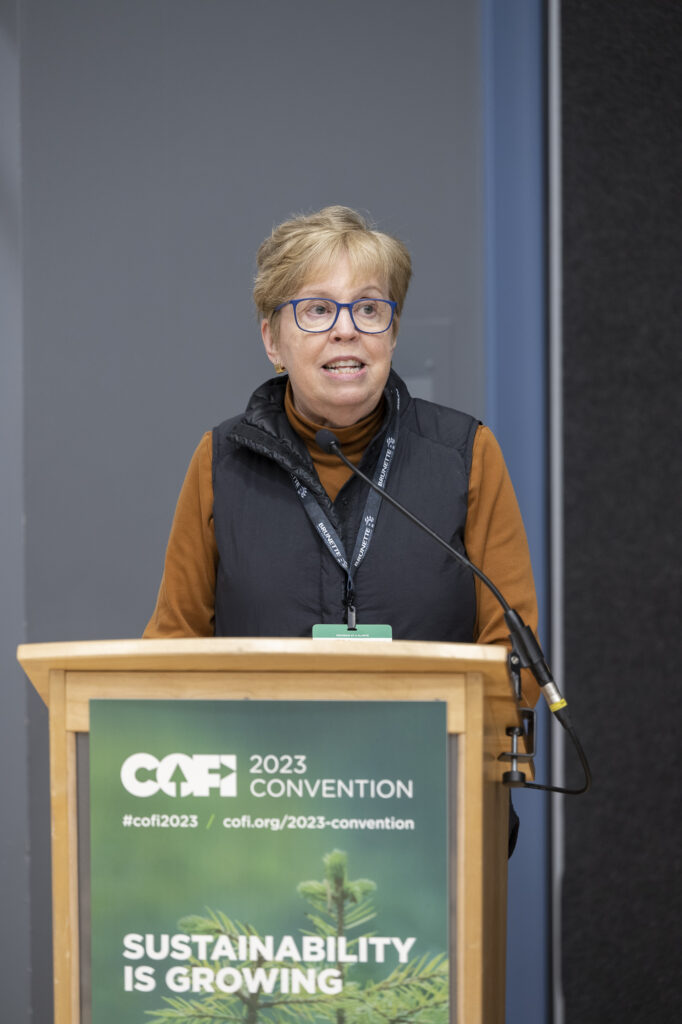
Features
Navigating transition: 2024 COFI Convention preview
March 22, 2024 By Linda Coady
 Linda Coady at the 2023 COFI Convention. Photo courtesy COFI.
Linda Coady at the 2023 COFI Convention. Photo courtesy COFI. On April 10-12, the BC Council of Forest Industries (COFI) will hold its annual COFI Convention at the JW Marriott Parq Hotel in Vancouver, B.C. One of the largest yearly gatherings of the forest sector in Western Canada, the convention will bring together forest companies, and related business and supply chains, with local, provincial, federal, and Indigenous leaders to hear from compelling speakers and discuss key issues and opportunities facing B.C.’s forest industry.
The convention comes at a time when interest in the present and future of B.C.’s forest industry has never been higher, and neither have the stakes. Across the province, key indicators in forestry are flashing red, foremost among them the current critical shortage of timber for B.C. mills. In the last five years, harvesting on public forest lands has dropped by almost half, down to 35 million cubic metres in 2023. The actual harvest in 2023 was 42 per cent below the allowable annual cut and 18 per cent below the actual harvest in 2022.
This steep trajectory has ignited a wave of curtailments and closures that have shuttered local sawmills along with the pulp and paper and value-added plants that rely on their outputs and residuals, resulting in the loss of an estimated 4,500 direct jobs in the last two years.
While change is inevitable, important and frequently necessary, a lot of change all at once in a relatively short period of time can have unintended consequences.
Notwithstanding a declining annual harvest due to fire, insects, market conditions and new policies, some of the consequences now unfolding in BC’s forest sector extend beyond what could be expected.
Left unchecked, current dynamics in the sector will result in a structural deficit in three ingredients required to meet growing demand locally and globally for wood products for green and affordable housing: Infrastructure, investment and workforce. It will also hinder B.C.’s ability to deliver the low-carbon and renewable bioproducts needed for a net-zero economy.
One thing everyone can agree on is that B.C.’s forest industry is in transition. Premier David Eby and Forests Minister Bruce Ralston have committed to working with the industry, First Nations, labour, and local communities to stabilize fibre supply and build a more predictable and sustainable path forward. A new Minister of State for Sustainable Forestry Innovation, Andrew Mercier, was appointed at the beginning of the year to identify what government and industry can do to increase the amount of fibre available to mills and communities in B.C. At the COFI Convention, we will have an opportunity to hear from Minister Mercier on the outcomes of his first 90 days.
Notwithstanding its current transition, the forest sector in B.C. continues to be a very significant part of the economic base of British Columbia, with outsized influence on wages, exports and government revenue. The industry also has significant expertise, resources and heavy equipment that can be deployed to reduce the risk and impact of wildfires. By restoring forest ecosystems to a more fire-resilient state, in ways that can also contribute to a more resilient forest manufacturing sector, the forest industry can continue to generate the many social, economic and environmental benefits on which we all depend.
In addition to hearing from cabinet ministers and other leaders in industry and government, an impressive list of keynote speakers and expert panelists will be sharing their insights on these and other challenges and opportunities facing B.C.’s second largest industry sector. Other notable speakers include:
- Regional Chief Terry Teegee, BC Assembly of First Nations, will discuss the implementation of BC’s Declaration on the Rights of Indigenous Peoples Act (DRIPA);
- Canada’s Deputy Ambassador to the U.S., Arun Alexander, will comment on how the relationship between Canada and the U.S. is changing in both a North American and global context;
- Chair and CEO of Abacus Data, David Coletto, will look at how the public conversation on wildfires in BC is evolving and the impact this is having on public perceptions of forest management;
- Don Iveson, former mayor of Edmonton – now an executive advisor on climate risk to Cooperators Insurance and co-chair of a new National Task Force on Climate and Housing – will look at the role local wood products can play in providing low carbon building materials to meet the demand for more housing … and more affordable and resilient housing and communities.
The convention will also feature a trade show component with more than 50 exhibitors. For further information or registration inquiries on the 2024 COFI Convention, visit cofi.org/2024-convention or email gillrie@cofi.org.
Linda Coady is the president and CEO of the BC Council of Forest Industries.
Print this page